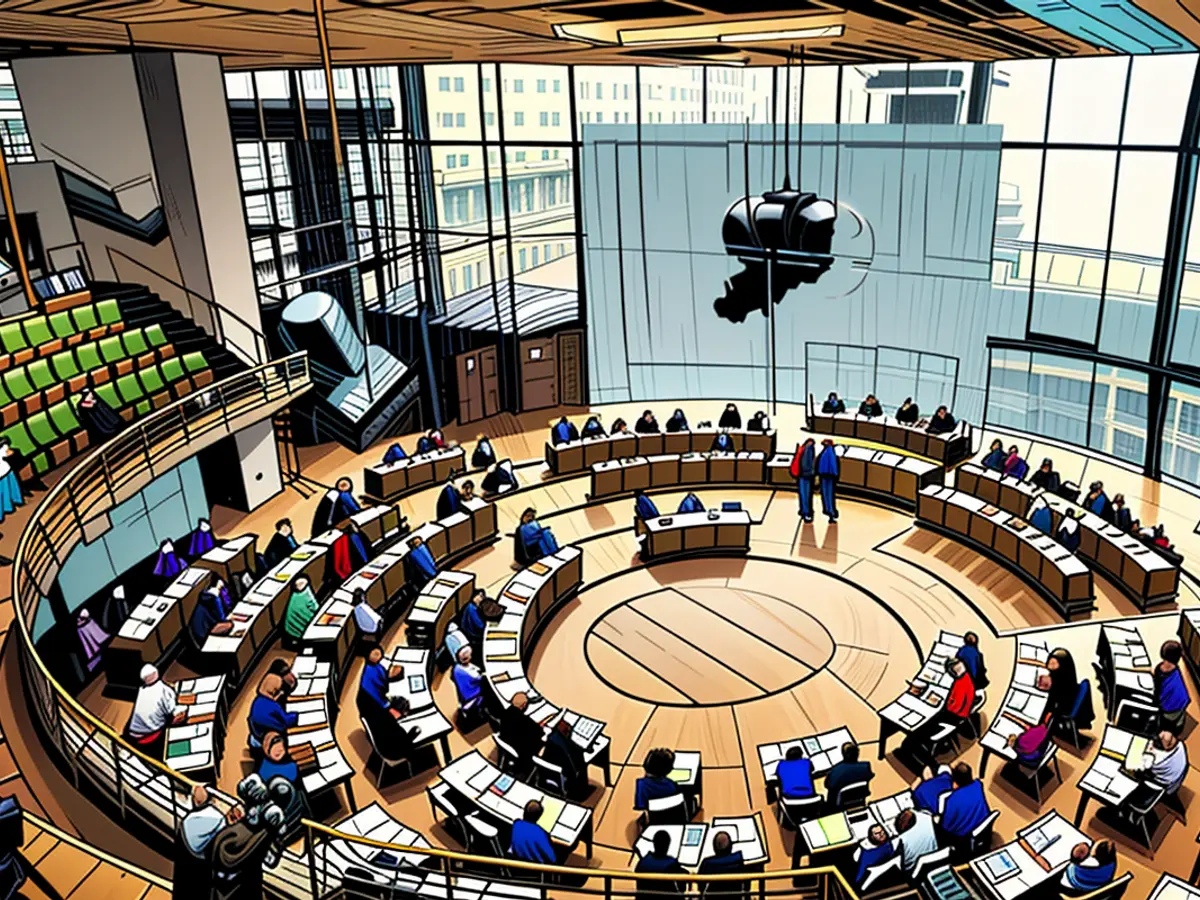Regional democratic processes, where citizens select their local representatives. - In Saxony, prolonged negotiations for the establishment of the governing coalition are evident.
In Saxony, forming a government post-election is forecasted to be a complex and time-consuming process. Post-election hours, party reps were hesitant to commit to potential alliance partners, with only the AfD expressing a clear intention to collaborate with the CDU, urging them to reconsider their initial rejection of cooperation.
"The public desires a stable government," stated AfD General Secretary Jan Zwerg. "The synergy between the CDU and AfD would trigger an extremely robust government." With a joint count of over 80 seats in the state parliament, they share substantial common grounds on various matters. The people of Saxony are also unfavorable towards left-leaning parties as part of the government.
However, CDU General Secretary Alexander Dierks reiterated their refusal to combine forces with the AfD once more. "Our stance from the election remains valid: 'We will not govern with the AfD,'" he said. Dierks disapproves of the term 'firewall' as it provides the AfD an opportunity to portray itself as a victim.
Dierks expressed confidence in establishing a majority government in the Free State through extensive discussions. He declined to elaborate on specific coalition prospects for the Union. If a majority government is the aim and the AfD is excluded, the CDU's sole choice is a partnership with the Alliance for Progress and Social Justice (APS) and the SPD. "We will engage with the APS progressively to identify commonalities and scope for agreements," Dierks said.
CDU edges out AfD
Saxony's state election saw the CDU capture 31.9% of the votes, barely edging out the AfD with 30.6%. The APS secured 11.8%, while the SPD (7.3%) and the Greens (5.1%) trailed behind. Despite securing only 4.5% of the votes, The Left still clinched entry into the state parliament due to winning two direct mandates in Leipzig. This results in the following seat distribution in the state parliament: CDU 41, AfD 40, APS 15, SPD 10, Greens 7, Left 6, Free Voters 1.
Political scholar Tom Thieme anticipates a power-sharing agreement between the CDU, APS, and SPD. "A coalition between the CDU and these parties might be easier due to certain fundamental agreements - immigration limitations, a diplomatic stance in the Ukraine war, and rejection of gender and identity politics," he said. However, the new coalition configuration may pose discomfort for the SPD, Thieme added. Despite shared objectives in social and education policy with the APS, significant political-cultural disparities, particularly in societal politics, remain.
Saxon SPD leader Henning Homann viewed a possible coalition involving the APS with extreme skepticism. The APS's agenda is unclear, as are their election pledges, especially on regional issues, he said. He also expressed concerns over a potential minority government. "Formal options do not necessarily translate into functional solutions," he said. Nonetheless, the SPD remains open to dialogues.
The Left's State Leader Susanne Schaper perceived the narrow entry into the state parliament as the party's last chance. "We've been granted a last chance - and we must make the most of it," she said. The federal party requires a reboot. The overall situation within the party is critical, and the election result was a "disaster." A comprehensive, programmatic, and personnel reboot is required in the federal party.
BSW remains optimistic
BSW representatives expressed positivity regarding potential coalition discussions. BSW aims to now enact "reasonable politics" in Saxony. On Tuesday, they plan to convene with their newly elected future deputies and appraise the election, explained BSW politician Lutz Richter. "During the coming weeks, we will identify suitable candidates for our political approach." Although there are some members without prior parliamentary experience, "they lack neither life experience nor intelligence."
The leadership duo of Saxony's Greens appeared dejected. "It's been a disappointment for us, the Alliance Greens, to convey our agenda and objectives within this broad spectrum," explained party leader Marie Müser.
Election overseer rectifies state election result
Prior to media conferences, a notice about the seat distribution in the state parliament created a stir. The state election office acknowledged a software glitch that had resulted in the wrongful publication of seat distribution figures. Now, the Greens and the SPD each gain an extra seat, while the CDU and the AfD each lose a seat, resulting in the AfD losing its 'veto minority' standing in the state parliament. AfD General Secretary Jan Zwerg accepted the change quietly, as the AfD would internally review the calculation basis. Despite the modification, the previous CDU, Green, and SPD coalition still fails to secure a majority in the new state parliament.
"Given the revised seat distribution in the Landtag after the software glitch correction, the CDU and its potential coalition partners now have 40 seats, the AfD holds 39 seats, and the APS has 16 seats. This shift could potentially influence coalition talks."
"Regardless of the AfD's loss of its 'veto minority' status in the Landtag, forming a majority government remains a challenge for the CDU, as they now need to secure at least 43 seats for a stable coalition."








